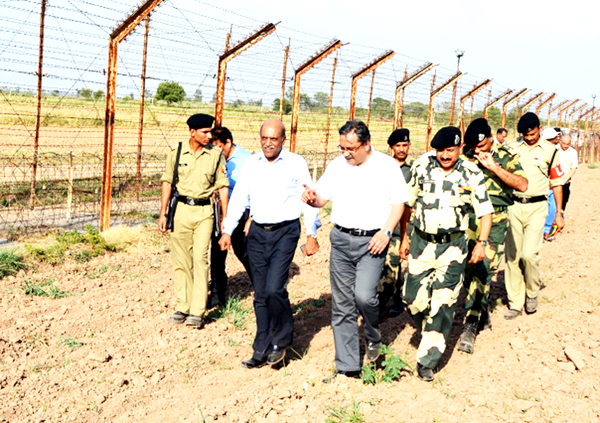Sanjeev Pargal
JAMMU, June 7: A high level delegation of the Union Ministry of Home Affairs (MHA) reviewed in-depth the existing ‘Border Security Management’ along the International Border (IB) and take measures to plug all infiltration routes to avert Pathankot-II by thwarting intrusions by the militants well in time.
The eight member high level delegation of National Security Council Secretariat (NSCS) has been deputed by Union Home Minister Rajnath Singh for detailed study of the ‘Border Security Management’ in Jammu and Punjab, identify areas, which required up-gradation of fencing like border riverines, management in un-fenced areas or where fencing is washed away during Monsoon, which is only few days away, and submit report to the MHA for taking steps to completely plug the gaps and stop infiltration.
However, there had been no infiltration by the militants from the International Border this year so far in Jammu sector especially after January 2 Pathankot terror attack in which seven security personnel and six militants were killed.
Official sources told the Excelsior that the MHA delegation headed by Madhukar Gupta, former Union Home Secretary and comprising top defence and fencing experts, visited the IB in RS Pura, Kathua and Samba sectors and Rajouri, where the BSF has been deployed in some areas along LoC. They examined the existing ‘Border Mechanism’ and steps to give to further boost.
The delegation today met Governor NN Vohra in Srinagar, the summer capital of the State, and discussed with him the security situation in the State and steps required to further boost security apparatus in the summer when the infiltration is at its peak. After the meeting, the delegation left for Punjab, where it will hold Jammu like survey on the IB to identify gaps and steps required to plug them.
IG BSF, Jammu Frontiers, DK Upadhyaya and other senior officers of the BSF briefed the visiting delegation about prevailing security situation on the borders in Jammu sector spanning over 198 kilometers from Lakhanpur to Akhnoor and spread over three districts of Jammu, Samba and Kathua, the border management system put in place by the BSF to thwart infiltration attempts and other security measures along the IB.
“Aim of the visit of Union Home Ministry’s delegation to Jammu followed by Punjab is to study and analyze the existing ‘Border Security and Management Mechanism’ and likely threats on the International Border with special reference to Indo-Pak border and make recommendations for further strengthening the borders to avoid any kind of infiltration and militant attacks on the National Highways like the one witnessed in Pathankot on January 2,” sources said.
The high level delegation conducted three-day visit covering vast portion of border Jammu, Samba and Kathua districts especially the vulnerable parts and took stock of border protection and domination of existing gaps. They also visited the tunnel, which had been dug by Pakistan in RS Pura sector to infiltrate militants, areas of gaps along rivers and Nullah, re-erection of border fencing under construction and some other spots, where the militants generally make the infiltration attempts.
According to sources, the MHA wants to put fool-proof `Border Security Management Mechanism’ in place, both along Jammu and Punjab borders, which have witnessed maximum attacks by the militants at security forces installations along the National Highway and major roads after infiltration into the Indian territory from Pakistan.
“The Ministry of Home Affairs didn’t want to take any chance of attacks by the Pakistani militants on security installations after January 2 Pakistan attack and it was in this connection that it has deputed high level team to study the situation along the IB in Jammu and Punjab and suggest measures, which were required to ensure zero infiltration on the borders,” sources said.
A series of attacks have taken place at security force installations including Army camps in Samba and Kathua districts, Hiranagar and Rajbagh police stations in Jammu sector, Pathankot airbase and Dinanagar police station in Punjab in the recent past. In almost all the cases, the militants were reported to have sneaked into the Indian territory from Pakistan by breaching the International Border, reached the National Highway using different modes of transport and carried out the terror attacks. However, after January 2, no terror attack has been reported, sources pointed out.
During the border visit, the high level team also inter-acted with senior officers of administration and local people of Samba and Kathua sectors to ascertain problems faced by the border dwellers.
“The problems faced by the border people will also form part of the high level team’s report as the MHA wanted to address them,” sources said.
Trending Now
E-Paper


